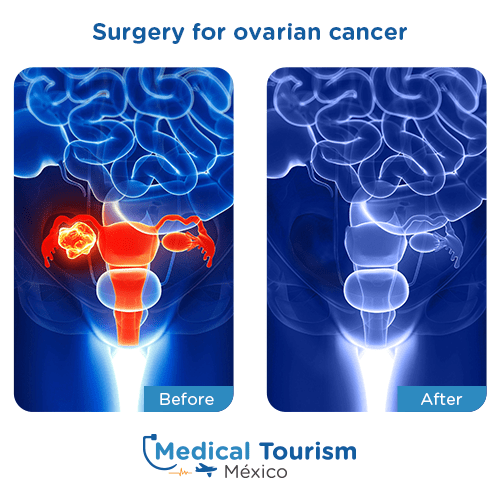The most reliable doctors in Mexico
Ovarian cancer information and locations in Mexico
Ovarian cancer is one of the most common cancers in women. This type of cancer starts on the
ovaries and usually spreads to the pelvis and abdomen. Early detection helps to increase the
success of treatment.
Ovarian cancer begins when abnormal cells in the ovaries start to grow out of control and form
into a tumor. The most common types of ovarian cancer are epithelial tumors; these begin in the
cells outside the ovaries, stromal tumors; they develop in the cells that produce female
hormones, and germ cell tumors; which are growths in the cells that produce the eggs.
The first approach for ovarian cancer is a hysterectomy and bilateral salpingo-oophorectomy surgery, which consists of removing as much cancer as possible; the extent of surgery will depend on the type and stage of cancer. Some patients might need chemotherapy or radiation therapy.
The first approach for ovarian cancer is a hysterectomy and bilateral salpingo-oophorectomy surgery, which consists of removing as much cancer as possible; the extent of surgery will depend on the type and stage of cancer. Some patients might need chemotherapy or radiation therapy.
Types of surgery for ovarian cancer
Surgery for early stage
Early stages mean that the cancer hasn’t spread to other organs. During surgery the
surgical oncologist, removes the affected ovary along with its fallopian tube.
If the cancer presents in both ovaries or is more extensive, the surgeon will remove both ovaries, fallopian tubes, uterus and nearby tissues.
If the cancer presents in both ovaries or is more extensive, the surgeon will remove both ovaries, fallopian tubes, uterus and nearby tissues.
Surgery for advanced stages
Advanced stages mean that the cancer has spread to other organs. During surgery, the
specialist removes the ovaries, fallopian tubes, womb, cervix, and as much as possible
of the cancer. You might have chemotherapy before and after surgery.
Get ovarian cancer surgery with the best oncologist in Mexico!
Benefits
Can relieve pain
Lower risk of side effects
Improves the quality of life
Reduces the risk of recurrence
Lower risk of side effects
Improves the quality of life
Reduces the risk of recurrence
Ovarian cancer
Procedure:
1 hr.
Hospital stay: 1 - 3 hrs.
Cleared to fly: 5 - 7 days
Hospital stay: 1 - 3 hrs.
Cleared to fly: 5 - 7 days
After surgery
Out of town patients’ follow-ups are scheduled with the surgical oncologist after 7-15 days from ovarian cancer
surgery. Patients are clear for flying after 5 -7 days from ovarian cancer surgery.
Note: Follow-ups can be arranged as face-to-face or virtually. If needed, you can go to your primary care physician to remove sutures or get medication adjustments.
As an Amazon Associate, we earn from qualifying purchases.
Take a look at one of our medical tourism essentials for general surgery.
Take a look at one of our medical tourism essentials for general surgery.
Before and after images
View additional images for this procedure.

View more


Locations
Select the city of your choice to seethe doctors profile.
Chihuahua, Chih.
Dr. Carlos M. Núñez
View more

Ovarian cancer frequent questions
Get answers to our most frequently asked questions and what to expect after the surgery.
Am I a candidate for ovarian cancer surgery?
Surgery is the most common approach to treat ovarian cancer. Your oncologist will discuss with you the type of surgery, as well as other forms of cancer treatment, like chemotherapy or radiotherapy.
What can I expect after surgery?
If both ovaries were removed and you haven’t gone through menopause, you will experience “clinical menopause”. Menopause symptoms can be very intense and difficult to cope with, talk to your oncologist if hormone replacement therapy can be an option.
How will the surgery affect my sex life?
Sex can be different after ovarian cancer surgery. An important organ of the female reproductive system was removed, so it can have an impact on how a woman feels; emotionally and physically. It’s recommended that you wait at least 3 weeks after surgery, as this gives you enough time to recover from surgery.
Recent news
Disclaimer: This information does not reflect the medical advice from our clinics. All cases are different and this treatment may not suit you. Always refer to a medical professional with the certification and experience. All of our physicians are fully qualified to perform these procedures. For more information and diagnosis contact one of our top specialized clinics.
In all medical procedures, there are chances of complications, the specialist will provide you detailed information about the risks of the procedure, talk to the specialist directly.
In all medical procedures, there are chances of complications, the specialist will provide you detailed information about the risks of the procedure, talk to the specialist directly.





